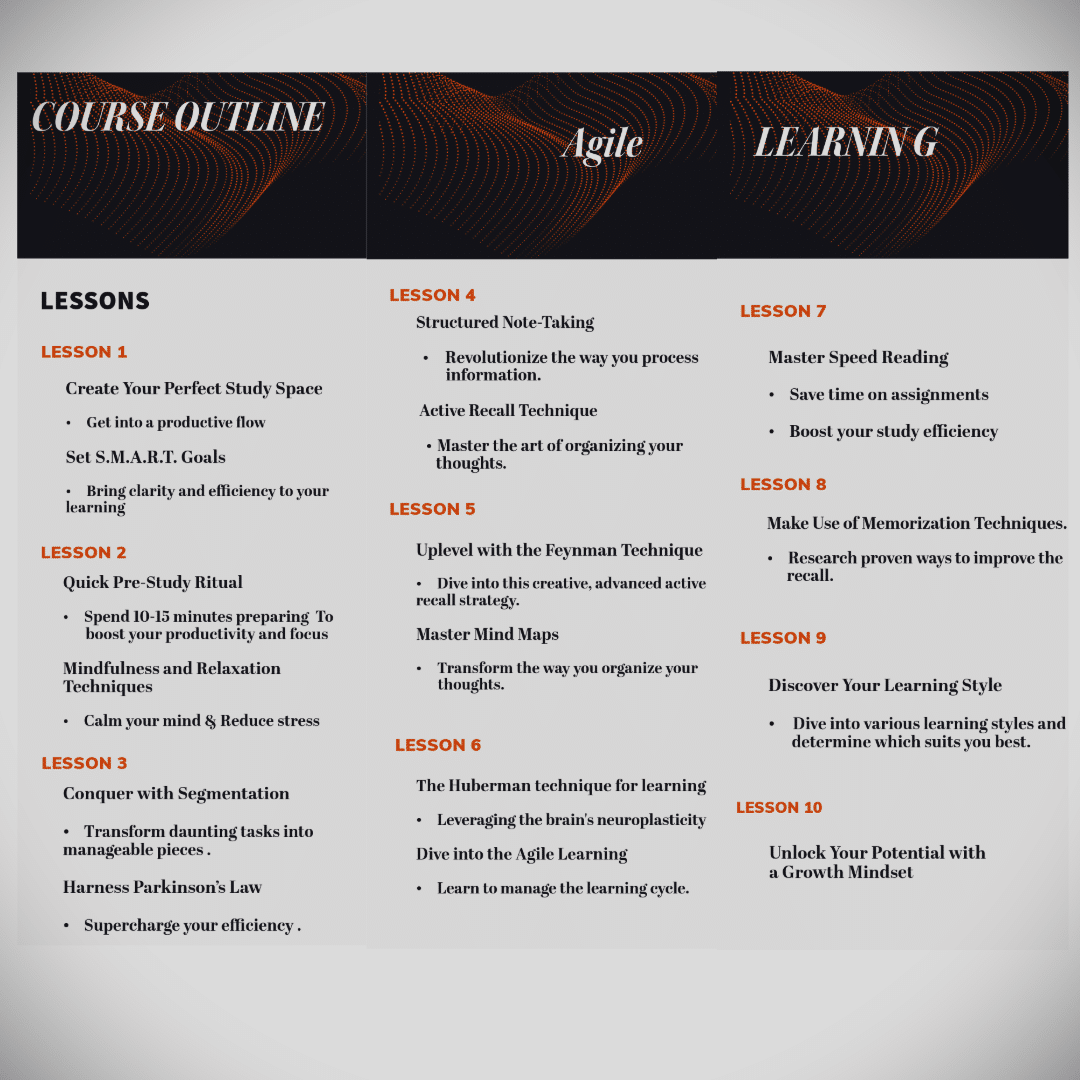FastTrack Learning
Accelerated Learning Strategies and Techniques Report
Introduction: Enhancing Retention and Comprehension of Course Material
As high school and college students, one of the key goals in our academic journey is to enhance our retention and comprehension of course material. The ability to effectively retain and understand the information presented in our classes is crucial for academic success and overall learning experience. However, achieving this goal can often be challenging due to various factors that may hinder our learning process.
Complications such as information overload, lack of engagement, ineffective study habits, and distractions can impede our efforts to fully grasp and remember the content being taught. These obstacles can lead to difficulties in retaining important concepts, applying them in assessments, and ultimately hinder our academic performance.
Understanding the complexities involved in enhancing retention and comprehension of course material is the first step towards overcoming these challenges. By being aware of the potential complications, we can then explore and implement effective accelerated learning strategies and techniques to optimize our learning experience and achieve academic success.
Overview of Accelerated Learning Strategies
Accelerated learning strategies are powerful techniques that can help high school and college students enhance their retention and comprehension of course material. By incorporating these strategies into your study routine, you can improve your ability to remember information, understand complex concepts, and perform better on exams.
Some key principles of accelerated learning include active participation, engagement, and multi-sensory experiences. Active participation involves interacting with the material rather than passively reading or listening. This can include taking notes, asking questions, or discussing the content with peers.
Engagement is another important aspect of accelerated learning. By staying engaged with the material, you are more likely to retain information and understand it on a deeper level. This can be achieved through activities such as creating mind maps, flashcards, or summaries of the material.
Utilizing multi-sensory experiences can also enhance your learning process. Engaging multiple senses, such as sight, hearing, and touch, can help create stronger connections in your brain and improve memory retention. For example, you can try using visual aids, listening to recordings of lectures, or even incorporating movement into your study sessions.
By implementing these accelerated learning strategies into your study routine, you can take your learning to the next level and achieve greater success in your academic endeavors.
Techniques to Improve Retention and Comprehension
Enhancing retention and comprehension of course material is crucial for high school and college students to succeed academically. Here are some effective techniques to help you improve your understanding and memory:
1. Active Listening: Stay engaged during lectures by taking notes, asking questions, and participating in discussions. Actively listening can help you retain information better.
2. Use Visual Aids: Visual aids such as diagrams, charts, and graphs can aid in understanding complex concepts and make it easier to remember information.
3. Practice Retrieval: Test yourself regularly on the material you have learned. This can help reinforce your memory and improve long-term retention.
4. Teach Someone Else: Explaining concepts to others can help solidify your understanding. Consider teaching a friend or family member to enhance your comprehension.
5. Create Mnemonics: Mnemonics are memory aids that can help you remember complex information by associating it with easy-to-recall patterns or phrases.
6. Break Down Information: Divide course material into smaller sections and focus on mastering one segment at a time. Breaking down information can make it easier to comprehend and retain.
7. Use Multiple Learning Styles: Incorporate different learning styles, such as visual, auditory, and kinesthetic, to enhance your understanding and retention of course material.
By implementing these techniques into your study routine, you can improve your retention and comprehension of course material, ultimately leading to academic success.
Interactive Learning Activities
One of the most effective ways to enhance retention and comprehension of course material is through interactive learning activities. By actively engaging with the material, you are more likely to remember and understand it better. Here are some interactive learning activities you can incorporate into your study routine:
1. Flashcards: Create flashcards with key concepts, terms, and definitions. Quiz yourself regularly using these flashcards to reinforce your memory.
2. Group Study Sessions: Join or form study groups with classmates to discuss and review course material. Teaching others can help solidify your own understanding of the subject.
3. Online Quizzes and Games: Utilize online platforms that offer quizzes and games related to your course material. These interactive tools can make learning more engaging and fun.
4. Mind Mapping: Create visual mind maps to organize and connect different concepts. This technique can help improve your understanding of complex topics.
5. Simulations and Virtual Labs: If applicable to your course, engage in simulations or virtual labs to apply theoretical knowledge in a practical context. This hands-on approach can deepen your understanding of the subject matter.
By incorporating these interactive learning activities into your study routine, you can enhance your retention and comprehension of course material, making your learning experience more effective and enjoyable.
Practice Exercises and Assessments
One of the most effective ways to enhance retention and comprehension of course material is through consistent practice exercises and assessments. By actively engaging with the material through practice, you reinforce your understanding and memory of the concepts.
Here are some strategies to maximize the benefits of practice exercises and assessments:
1. Spaced Repetition: Instead of cramming all the information at once, space out your practice sessions over time. This technique helps strengthen long-term memory and retention.
2. Self-Testing: Challenge yourself with self-assessments or quizzes to gauge your understanding. Identify areas where you need improvement and focus on those during your study sessions.
3. Active Learning: Rather than passively reading or listening to lectures, actively engage with the material by solving problems, discussing concepts with peers, or teaching the content to someone else.
4. Variety of Practice: Use a variety of practice exercises such as flashcards, concept maps, practice problems, and online quizzes to reinforce different aspects of the course material.
5. Feedback Loop: Seek feedback from instructors, tutors, or classmates on your practice exercises. Understanding your mistakes and learning from them can significantly improve your comprehension and retention.
By incorporating these strategies into your study routine, you can enhance your retention and comprehension of course material, leading to improved academic performance and success.
Integration of Learning Strategies into Study Routine
Enhancing retention and comprehension of course material requires the integration of effective learning strategies into your daily study routine. By incorporating these strategies consistently, you can optimize your learning process and achieve better academic results. Here are some key tips to help you integrate learning strategies into your study routine:
1. Active Learning: Instead of passively reading or listening to lectures, actively engage with the material. Take notes, ask questions, and participate in discussions to deepen your understanding.
2. Spaced Repetition: Review course material at regular intervals to reinforce your memory. Use spaced repetition techniques to gradually extend the time between review sessions, helping you retain information in the long term.
3. Mnemonic Devices: Utilize mnemonic devices such as acronyms, visual imagery, or rhymes to aid in memory retention. These techniques can make it easier to recall complex information during exams.
4. Practice Retrieval: Test yourself regularly on the material you have learned. Practice retrieval through quizzes, flashcards, or summarization exercises to reinforce your memory and comprehension.
5. Teach Others: One of the most effective ways to solidify your understanding of course material is to teach it to someone else. By explaining concepts to others, you reinforce your own knowledge and identify areas that need further clarification.
By incorporating these learning strategies into your study routine, you can enhance your retention and comprehension of course material, leading to improved academic performance and success in your high school or college courses.
Enhancing Retention and Comprehension Through Accelerated Learning
As high school and college students, your academic success is dependent on your ability to retain and comprehend course material effectively. Through the exploration of accelerated learning strategies and techniques in this report, you have gained valuable insights into how you can enhance your learning experience and achieve your academic goals.
Remember, the key to mastering course material lies in utilizing proven methods such as active learning, spaced repetition, and mnemonic devices. By incorporating these strategies into your study routine, you can significantly improve your retention and comprehension of complex subjects.
If you ever find yourself struggling with your coursework, I encourage you to revisit this report for a refresher on the various accelerated learning techniques discussed. Additionally, consider exploring an online course dedicated to accelerated learning to further expand your knowledge and skills in this area.
By investing time and effort into implementing these strategies, you are taking proactive steps towards becoming a more efficient and effective learner. Embrace the challenge of mastering new concepts and remember that with dedication and the right tools, you can achieve your academic goals successfully.

